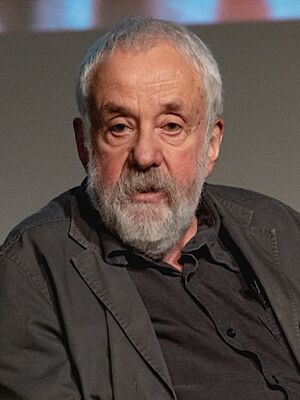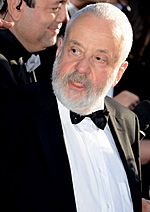Mike Leigh facts for kids
Quick facts for kids
Mike Leigh
OBE, FRSL
|
|
|---|---|

Leigh in 2021
|
|
| Born | 20 February 1943 Welwyn Garden City, England
|
| Alma mater |
|
| Occupation | Director, screenwriter, producer, actor |
| Years active | 1963–present |
| Spouse(s) |
Alison Steadman
(m. 1973; div. 2001) |
| Children | 2 |
Mike Leigh (born 20 February 1943) is an English director and writer of films, plays, and television shows. He has had a successful career for over 60 years. Leigh is famous for making movies that feel very real, often showing the lives of ordinary British families.
He has won major awards at famous film festivals like Cannes, Berlin, and Venice. He has also won three BAFTA Awards and has been nominated for seven Academy Awards. In 1993, he was made an Officer of the Order of the British Empire (OBE) for his work in the film industry.
Leigh is known for his special way of making films. He works closely with his actors for weeks or even months, using improvisation to build the characters and story together. His goal is to create films that are emotional and show life as it really is.
Contents
Early Life and School
Mike Leigh was born on 20 February 1943, in Hertfordshire, England. His father, Alfred, was a doctor, and his mother was named Phyllis. He grew up in the Broughton area of Salford, a city in northern England. His family was Jewish, and his grandparents on his father's side had moved to England from Russia.
As a boy, Leigh loved art and cinema. He enjoyed drawing, watching movies, and listening to comedy shows like The Goon Show. His father did not want him to be an artist or an actor and saw his creative interests as a problem.
Despite this, Leigh won a scholarship to the famous Royal Academy of Dramatic Art (RADA) in London in 1960. He trained as an actor but soon realized he was more interested in directing. He also studied at several art schools, including the Camberwell School of Art and the London Film School.
Career Journey
Starting in Theatre and TV
In the mid-1960s, Leigh began directing plays. He developed a unique method where the script was created during rehearsals with the actors. This was a new and exciting way to make theatre.
During the 1970s, he started making plays for BBC Television. Some of his most famous TV plays from this time are Nuts in May (1976) and Abigail's Party (1977). These works were often funny but also showed the awkward and sometimes sad side of everyday life. Abigail's Party is about a get-together that slowly goes wrong and became very popular.
Making a Mark in Movies
Leigh's films often explore the lives of working-class and middle-class families in Britain. He became well-known for his realistic and emotional storytelling.
First Feature Films
His first feature film was Bleak Moments (1971). In 1983, he directed Meantime, a film about a family struggling with unemployment, starring young actors Gary Oldman and Tim Roth.
In the 1990s, Leigh's films gained more attention. Life Is Sweet (1990) is a comedy about a quirky working-class family in London. His 1993 film ... was a darker comedy that won him the Best Director award at the Cannes Film Festival.
International Fame
The film Secrets & Lies (1996) made Leigh famous around the world. The story is about a woman who discovers she has a secret daughter and the family drama that follows. The film won the top prize, the Palme d'Or, at the Cannes Film Festival. It was also nominated for five Academy Awards, including Best Picture.
In 1999, he directed Topsy-Turvy, a colorful movie about the famous musical writers Gilbert and Sullivan. It showed a different side of his work, focusing on history and art.
21st-Century Films
Leigh continued to make powerful films in the 2000s. Vera Drake (2004) is set in 1950s London. It tells the story of a kind woman who secretly helps other women with a procedure that was illegal at the time. The film won the Golden Lion, the top prize at the Venice International Film Festival.
His 2008 film, Happy-Go-Lucky, is a bright and cheerful comedy about a very optimistic schoolteacher named Poppy, played by Sally Hawkins.
More recently, Leigh directed Mr. Turner (2014), a film about the life of the great British painter J. M. W. Turner. In 2018, he released Peterloo, a historical drama about the Peterloo Massacre of 1819, a key event in British history. His latest film, Hard Truths, was released in 2024.
How Mike Leigh Makes His Films
Mike Leigh's filmmaking process is very unusual. He does not start with a finished script. Instead, he begins with a basic idea and a group of actors.
- Improvisation: For several months, Leigh and the actors work together. They improvise scenes and conversations to create their characters from scratch. The actors discover their characters' personalities, histories, and relationships through this process.
- Building the Story: As the characters develop, a story begins to form. Leigh guides the process, deciding which scenes will become part of the final film.
- Writing the Script: Only after months of rehearsal does Leigh write down the dialogue and actions. By this time, the actors know their characters so well that the performances feel completely natural.
This method helps him create films that are incredibly realistic and full of genuine emotion. He wants his films to feel like "real life" and to connect with the audience on a deep level.
Personal Life
In 1973, Mike Leigh married the actress Alison Steadman. She starred in many of his plays and films, including Abigail's Party. They have two sons. The couple divorced in 2001. Leigh is a supporter of Humanists UK and believes in a government where the head of state is not a monarch.
Filmography
| Year | Title | Distribution |
|---|---|---|
| 1971 | Bleak Moments | BBC Films |
| 1983 | Meantime | |
| 1988 | High Hopes | Palace Pictures |
| 1990 | Life Is Sweet | |
| 1993 | ... | First Independent Films |
| 1996 | Secrets & Lies | FilmFour Distributors |
| 1997 | Career Girls | |
| 1999 | Topsy-Turvy | Pathé Distribution |
| 2002 | All or Nothing | UGC Films UK |
| 2004 | Vera Drake | Momentum Pictures |
| 2008 | Happy-Go-Lucky | |
| 2010 | Another Year | |
| 2014 | Mr. Turner | |
| 2018 | Peterloo | Entertainment One/Amazon |
| 2024 | Hard Truths | StudioCanal |
Awards and Honours
Mike Leigh has received many awards for his work. He has been nominated for an Academy Award seven times.
- Cannes Film Festival: He won Best Director for ... (1993) and the top prize, the Palme d'Or, for Secrets & Lies (1996).
- Venice Film Festival: He won the top prize, the Golden Lion, for Vera Drake (2004).
- BAFTA Awards: He has won three BAFTAs, including Best Director for Vera Drake.
Many actors have also won major awards for their performances in his films, including Brenda Blethyn, Timothy Spall, and Sally Hawkins.
See also
 In Spanish: Mike Leigh para niños
In Spanish: Mike Leigh para niños
- Kitchen sink realism
- Working class culture
 | John T. Biggers |
 | Thomas Blackshear |
 | Mark Bradford |
 | Beverly Buchanan |


